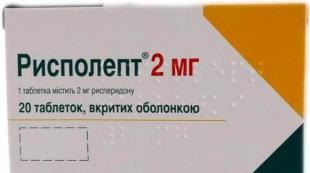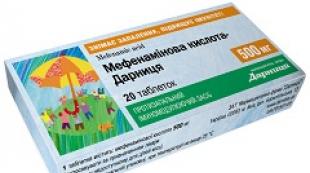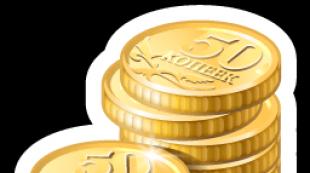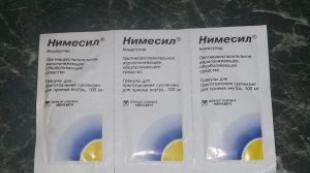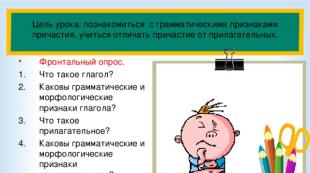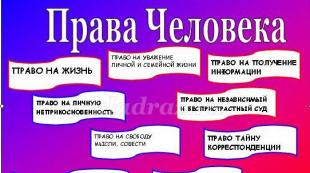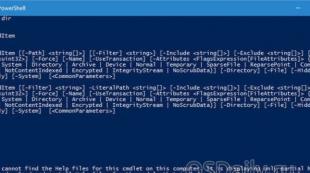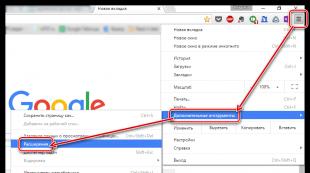Euphorbium compositum drops instructions for use. "Euphorbium compositum": instructions, analogues and reviews
Euphorbium Compositum Nazentropfen S is a complex homeopathic medicine used to treat certain diseases of the ENT organs.
This homeopathic medicine is manufactured by Heel in Germany.
Today, Euphorbium Compositum is the most famous and popular homeopathic medicine for rhinitis (runny nose) and sinusitis (sinusitis and sinusitis).
The medicine is a clear or slightly yellow nasal spray, devoid of any odor. Please note that Compositum is not available in the form of nasal drops. Nevertheless, they are also quite effective.
Euphorbium Compositum is sold in regular and homeopathic pharmacies without a prescription at fairly high undemocratic prices.
Euphorbium Compositum for the treatment of children should be used in strict accordance with the instructions for use.
According to the instructions for use of Euphorbium Compositum, it should be stored in a dry place inaccessible to sunlight and children. The recommended storage temperature is 15-25 degrees Celsius. If the storage requirements for the medicinal product are properly met, its shelf life declared by the manufacturer is 5 years from the date of manufacture.
Price
Currently, prices for Euphorbium Compositum Nazentropfen S on pharmacy counters range from 445 to 700 rubles.
In this regard, you should not buy the medicine at the first pharmacy you come across on the way home from work. If you spend a little time and do a little market research, you can save a lot and buy this homeopathic medicine at the best possible price.
Indications for use

Instructions for use of Euphorbium Compositum Nazentropfen S nasal spray recommends using the product for the following three diseases:
- rhinitis of various origins;
- chronic sinusitis;
- adenoids;
- various otitises;
- Eustachitis.
Rhinitis of various origins (etiology) should be understood as all types of runny nose. Thus, Euphorbium Compositum can be used for vasomotor, allergic, neurovegetative, atrophic, medicinal, hypertrophic, catarrhal rhinitis and ozena.
Chronic sinusitis should be understood as all existing varieties. Sinusitis, frontal sinusitis, sphenoiditis and ethmoiditis. For many people it has become an excellent alternative to antibiotics and punctures.
Release forms
Euphorbium Compositum is produced exclusively in the form of a spray (aerosol) for nasal irrigation. The volume of the dark glass bottle is 20 ml. All bottles are already equipped with measuring dispensers and protective caps.
Many people ask pharmacies for this homeopathic remedy in the form of drops. Of course, there is no such thing. All this can be explained quite simply. We are accustomed to drops being put into the nose. After all, not so long ago, many nasal medications began to be produced in the form of sprays.
Instructions for using Euphorbium Compositum nasal spray contain an algorithm of actions for correctly starting to take a homeopathic remedy:

- remove the bottle from the cardboard box and remove the protective ring;
- remove the protective cap;
- make several successive squeezing movements aimed at the container with the medicine until a cloud appears;
- insert the dispenser into one of the nostrils of the nose and irrigate (repeat the injection for the second nostril).
For the treatment of children aged 4-6 years, apply 1 injection into each nostril of the nose 3-4 times a day.
For the treatment of children over 6 years of age and adult patients, apply 1-2 injections into each nostril of the nose 4-5 times a day.
Contraindications, overdose and side effects
Euphorbium Compositum nasal spray has the following contraindications:
- individual intolerance and hypersensitivity to the components of the drug;
- children under 4 years of age.
To date, no cases of overdose with Euphorbium Compositum have been recorded.
Homeopathic medicine has the following extremely rare side effects:
- allergic reactions;
- the appearance of bronchospasm;
- increased salivation.
Efficiency and reviews
The situation here is twofold.

On the one hand, there are a huge number of positive reviews. Homeopathy treatment is becoming increasingly popular every year.
On the other hand, homeopathy is still not recognized by classical medicine. Among the medical community, reviews of homeopathic remedies are far from clear. Doctors of classical medicine call homeopaths differently: some call them clever psychologists who play the soul of the sick on the strings, others call them charlatans.
The choice of whom to believe is yours. Compositum has too many positive reviews for one to simply brush them aside.
During pregnancy and lactation
As a rule, doctors do not object to pregnant and breastfeeding women using this homeopathic nasal spray.
Analogs
Homeopathic analogues of Euphorbium Compositum are the following medicines:
- Cinnabsin;
- Delufen.
Along with traditional medicines, you can often find various homeopathic remedies in pharmacies for the treatment of certain diseases.
For those who regularly experience a runny nose, we can recommend a homeopathic remedy such as Euformium compositum.
For a long time, traditional medicine, and even ordinary citizens, were suspicious of various homeopathic remedies. However, homeopathy does not stand still, it is developing and creating more and more effective and efficient drugs. In this regard, confidence in them, of course, increases.
Nasal drops
The main idea of homeopathy is like to like. That is, it proceeds from the assumption that substances that, in large doses, lead to certain symptoms, in small doses will fight these symptoms.
Description of the drug and composition
Euphorbium composatum is a complex of eight components, both plant and mineral origin.
They are mixed in equal proportions, and together they have the most beneficial effect on the condition of the mucous membrane. In addition, the drug helps improve local immunity.
- Euphorbium compositum is available in three different forms:
- injection;
spray;
However, these three forms are intended specifically to treat runny nose and nasal congestion.
Usually you can find a spray in pharmacies, but you can easily find drops and an injection solution.
The drug has a very positive effect on the condition of the mucous membrane: moisturizes it, promotes normal metabolism in it, and relieves swelling. In addition, the components of this product help improve local immunity.
Thanks to these properties, Euphorbium compositum helps cope with chronic rhinitis, relieves acute conditions, helps prevent infection or shortens the course of the disease. It also helps alleviate the condition of allergic patients. The effect of this drug accumulates more slowly compared to vasoconstrictor drugs - 3-5 days
. But it also persists for quite a long period.
Using Euphorbium compositum drops and spray is very simple. For children from 4 to 6 years old, drop (or spray) into the nose once 3-4 times a day. For children over 6 years of age and adults, the dose is different: 1-2 doses 3-5 times a day.
Important! Remember that Euphorbium compositum helps get rid of nasal congestion, moisturize the mucous membrane and relieve swelling, increases local immunity, but does not fight infections.
It is recommended to use the drug Euorbium compositum for sinusitis, allergies, chronic and atrophic rhinitis. However, do not forget that this drug can only be used in combination with other medications.

Euphorbium compositum drops
As a contraindication, the instructions mention only individual intolerance to the components and age under 4 years. And the latter is due to the lack of clinical studies of the drug in children.
Important! Euphorbium compositum should be used with caution by those who have problems with the thyroid gland, since the medicine contains iodine.
Pregnancy
Euphorbium compositum should be used with caution during pregnancy, as with other medications. It should not cause any harm to either the mother or the child, and yet it is better not to take it without consulting a doctor.
In the end, each woman experiences pregnancy individually, and even the second and third pregnancies of the same woman will not proceed in the same way. You never know what exactly will cause certain problems.
Euphorbium is a homeopathic remedy. Helps with a number of serious colds. The list of indications for treatment with Euphorbium includes:
- ozena (foul-smelling runny nose, purulent rhinitis);
- inflammation of the middle ear and eustachian tube, especially if the disease is viral in nature;
- ordinary rhinitis of a viral, bacterial or allergic nature;
- sinusitis in acute and chronic form;
- vasomotor, hyperplastic, dry or atrophic rhinitis.
It also helps with inflamed adenoids (with adenoiditis, it relieves swelling in the nose). The list of indications for treatment with the drug includes a wide range of diseases of the nose, throat, lungs, and ear. However, this drug should not be used without a doctor's recommendation.
Composition of the drug Euphorbium
The active component of the drug Euphorbium is Euphorbium D4 (resin-bearing spurge). Also, the therapeutic effect of the product is provided by other components. Each bottle of the drug contains one gram of them. Let's list them:
- Pulsatilla pretensis D2;
- covered luffa D2;
- mercury biiodate D8;
- domestic pig nasal mucosa;
- lime sulfur liver;
- silver nitrate;
- sinusitis nosode.
 However, these are not all components of the medicine. The composition contains some excipients that are also important. Euphorbium compositum, a remedy for sinusitis, contains:
However, these are not all components of the medicine. The composition contains some excipients that are also important. Euphorbium compositum, a remedy for sinusitis, contains:
- 20 mg benzalkonium chloride solution;
- 829.2 mg sodium chloride (table salt);
- 62.8 mg sodium dihydrogen phosphate dihydrate;
- 20 mg sodium hydrogen phosphate dihydrate;
- 91 g purified water.
pharmachologic effect
Euphorbium has a complex effect on the patient's body. Therefore, doctors often recommend it for rhinitis or sinusitis. We list the beneficial effects of treatment with Euphorbium:
- relieving swelling of the mucous membrane;
- anti-inflammatory effect;
- antiviral effect;
- antiallergic (antistaminic).
Also corrects immunity for rhinitis and sinusitis. It activates the defenses of the human body and normalizes its functioning. All this is thanks to the natural mineral, plant and animal components contained in the medicine.
Release forms
The main form of release of the drug Euphorbium compositum is a nasal spray. This version of the remedy is suitable for the treatment of diseases of the ears and nose. However, there are other varieties of Euphorbium:
- Euphorbium compositum drops in the nose;
- injection solution (especially for restoring immunity);
- granules (here the dose of the substance that has the main effect is optimally selected).
Before using any form of release, you should definitely go to a specialist. When used correctly, they help cope with problems, but when used incorrectly, they only aggravate the condition. The interaction between the doctor and the patient is the key to the patient’s recovery.
How to take for various forms of sinusitis?
 Euphorbium is perfect for treating children and adults. For adult patients, the dosage is selected individually. It is necessary to take into account the age, height, and body weight of the patient. The presence of concomitant diseases is also important.
Euphorbium is perfect for treating children and adults. For adult patients, the dosage is selected individually. It is necessary to take into account the age, height, and body weight of the patient. The presence of concomitant diseases is also important.
Both adults and children use Euphorbium under the supervision of a competent homeopathic physician. Otherwise, instead of the desired effect, unpleasant consequences may appear. Only cooperation between doctor and patient will allow a person to be cured quickly.
It is also very important to take into account the information written in the instructions. It is usually placed in a box with the drug. It is not advisable to throw away the instructions. It is necessary to familiarize yourself with the contents of this document in order for the drug to have the desired effect.
Use of the drug Euphorbium by children
For the treatment of sinusitis (acute and chronic), children are advised to use standard doses. A doctor can prescribe this remedy to a patient at least 4 years old. Dosage of Euphorbium for children:
- one dose three times - four times a day - up to 6 years (one pea or ten drops);
- after the age of six - two doses three times a day (morning, afternoon and evening) or five times a day.
Before starting treatment, the child should be shown to the pediatrician. You also need to consider what medications the little patient is already taking. Not all medicines are compatible with Euphorbium, especially homeopathic ones.
Use during pregnancy and breastfeeding
 When feeding infants and during pregnancy, the use of Euphorbium and other homeopathic remedies is allowed. However, it is important to make sure that the woman does not have an individual intolerance to this medicine for the treatment of inflammation of the ENT organs. The composition of the drug is absolutely safe for pregnancy: it will not harm the development of the child.
When feeding infants and during pregnancy, the use of Euphorbium and other homeopathic remedies is allowed. However, it is important to make sure that the woman does not have an individual intolerance to this medicine for the treatment of inflammation of the ENT organs. The composition of the drug is absolutely safe for pregnancy: it will not harm the development of the child.
However, self-medication during breastfeeding or pregnancy is unacceptable. Monitoring by a doctor will reduce the risk of complications.
Contraindications and side effects
Some people may be allergic to components of Euphorbium. Also, side effects of the drug occur with the wrong dosage. These include:
- burning sensation in the nasal cavity;
- spasms in the bronchi;
- increased secretion of mucus from the nose;
- increased salivation.
Burning and dryness of the nasal mucosa are a fairly common manifestation caused by violation of the rules for using the medicine. Then you need to reduce the dose. And for allergy sufferers it is better to use other medications. These recommendations are based on many years of practical use of Euphorbium.
Interaction with other medications
Use cautiously with thyroid medications. The use of Euphorbium compositum in this situation should be approached responsibly, because it contains iodine. Combination with other homeopathic remedies is also undesirable, so as not to aggravate the symptoms.
Euphorbium analogs
If a person does not find a bottle of Euphorbium in the pharmacy or some components of the homeopathic remedy are not suitable for him, he can buy other drops. However, to select a medicine you need to know the specifics of the disease. Let's give examples of analogues.
- To narrow the blood vessels of the nasal mucosa. They relieve nasal congestion. These drops are used mainly in the evenings to avoid discomfort during sleep. The most famous name is Naphthyzin. However, Brizolin, Nafazol-Hemofarm, Otrivin, Tizin, Rinostop, Fervex spray, Vibrocil, Xylene, Ximelin, Nazol, Olint, Sanorin, Galazolin, Nazolin, Nazivin, Xylometalosin, Dlynos are also suitable.
- Nasal secretion thinning drops. Suitable when mucus becomes thick and nasal congestion occurs. Designed to cleanse the nose. Example - Rinofluimucil.
- Emollients. Kameton, the well-known balm called “Golden Star”, Pinosol, Mentoclar, Evamenol, Suprima Plus, improved Nazol.
- Local antibiotics. Good when the disease is caused by bacteria. Bioparox, Bactroban, Polydexa with the addition of phenyephrine and Isofra.
- Washing solutions. Based on sea salt and water. These are Aqua-Lor, Aquamaris, Physiomer, Dolphin, Salin, saline solution. You can even make such a remedy yourself from table salt and water. Such solutions are good for sinusitis and rhinitis, as they eliminate pus and mucus.
- Antiseptic drugs. Protargol, colloidal silver, Collargol, Octenisept, Miramistin.
- Hormones are effective for allergy sufferers. Beconase, Alcedin, Nasobek, Nasonex, Flixonase. Other drops and sprays for allergy sufferers: Histimet, Allergodil, Ifiral, Kromosol, Kromoglin, Sanorin-anallergin.
- Immunomodulators for nasal use: IRS-19, Poludan and Derinat.
- Drops that reduce nasal secretion. Sinuforte and Atrovent.
- Antiviral drugs. This is Viferon and Grippferon ointment.
- Homeopathic remedies. Rhinitol, Euphorbium Compoliteum and thuja oil. Homeopathy helps with proper dosage.
Where to buy the drug and the average cost of the drug in pharmacies in Russia and the CIS?
Euphorbium is sold in pharmacies. It can be purchased either conventionally or online. Available without a prescription.
 In Russia, a bottle of Euphorbium drops costs 375 rubles. In Ukraine, the product can be purchased for 197 hryvnia 97 kopecks. Prices vary in different pharmacy chains in the CIS and Baltic countries.
In Russia, a bottle of Euphorbium drops costs 375 rubles. In Ukraine, the product can be purchased for 197 hryvnia 97 kopecks. Prices vary in different pharmacy chains in the CIS and Baltic countries.
Euphorbium compositum is a homeopathic medicine from the German company Heel, intended for use in otorhinolaryngological practice for rhinitis and sinusitis. Today on the Russian pharmaceutical market there are many medicines for the treatment of the runny nose - drops, sprays, ointments, etc. They contain potent substances: glucocorticosteroids, sympathomimetics, substances with antihistamine activity. Without denying their effectiveness, it is necessary to note the significant number of side effects they cause, which significantly limit their use in ENT practice. A fundamentally different picture is observed with homeopathic medicines and, in particular, with Euphorbium compositum nasal spray. This drug is not for immediate effect, but to act directly on the cause of the disease and, ultimately, for complete healing of the patient. Its action is determined by the multicomponent composition:
Euphorbia resiniferous. Reduces the severity of inflammation in the upper parts of the respiratory tract, relieves irritation, discomfort (dryness, burning) and pain due to infectious lesions of the mucous membranes;
Meadow lumbago. Effective for inflammation of the middle ear, pharynx, and upper parts of the bronchial tree. Relieves irritation and discomfort;
Luffa covered. Used for allergic rhinitis;
Mercury diiodide. Eliminates inflammation of the nasopharynx, pharynx, tonsils, incl. with copious exudate;
Sulfur calcium liver. It is used to relieve inflammation of the middle ear, abscess of the tonsils, and prevents purulent manifestations;
Silver nitrate. Copes well with lesions of the mucous membranes of the pharynx, conjunctiva, and middle ear;
Nasal mucosa. Used for chronic inflammation of the paranasal sinuses, polyps;
Sinusitis nosode. Effective for sinusitis, adenoiditis, so-called. "fetid runny nose."
Euphorbium compositum has anti-inflammatory, anti-allergic, anti-exudative, decongestant, immunomodulatory and antiviral (including
h. direct) action. The drug does not contain antibiotics, vasoconstrictors, antihistamines and hormonal drugs, which increases its safety profile, improves tolerability, and minimizes the risk of unwanted side effects. Euphorbium compositum is indicated for use in pediatric practice in patients over 2 years of age. It can also be used in elderly people and patients with concomitant diseases. Homeopathic medicines from Heel are widely used in more than 60 countries around the world. Euphorbium compositum is the only remedy of its kind, the action of which is aimed primarily not at narrowing the blood vessels of the nose and/or reducing the permeability of their walls, but at restoring the affected mucous membrane. The drug is also effective as a means of preventing acute respiratory infections and influenza. It is equally effective for acute and chronic diseases. Euphorbium compositum does not cause spastic contraction of the vascular walls of the blood vessels of the nose and does not lead to drying out of the mucous membranes. With prolonged use of the drug, there is no weakening of its effect caused by addiction. Euphorbium compositum combines well with other drugs and has no undesirable pharmacological interactions. It has no age or gender restrictions. There are no contraindications to its use, with the exception of cases of individual intolerance and children under 2 years of age. The only possible side effect is rare allergic reactions and cases of hypersalivation (increased salivation). You should be aware that at the initial stage of taking the drug, a temporary deterioration in the patient’s condition is possible (the so-called primary deterioration). In the words of Elena Malysheva, “this is the norm.” Cases of overdose with homeopathic medicines are practically excluded; however, it is recommended to adhere to the daily doses stated by the manufacturer in the instructions for use.
Pharmacology
A multicomponent homeopathic medicine, the effect of which is determined by the components included in its composition.
Release form
Homeopathic nasal spray in the form of a clear or slightly opalescent, colorless or light yellow odorless liquid.
Excipients: benzalkonium chloride solution - 0.02 g, sodium chloride 0.8292 g, sodium dihydrogen phosphate dihydrate - 0.0628 g, sodium hydrogen phosphate dihydrate - 0.02 g, purified water - 91.068 g.
20 ml - dark glass bottles with a spray dispenser (1) - cardboard packs.
Dosage
Children from 6 to 12 years old, as well as children over 12 years old and adults, inject 1-2 doses into each nasal passage 3-5 times a day; Children from 4 to 6 years old are carefully injected with 1 dose 3-4 times a day.
Overdose
Cases of overdose have not been reported to date.Interaction
The use of the drug does not exclude the use of other medications.
Side effects
Allergic reactions are possible.
In rare cases, increased salivation may occur after using the drug.
In very rare cases, bronchospasm may occur in patients with a predisposition to asthma. If they develop, you must stop using the drug and consult your doctor.
Indications
- rhinitis of various etiologies;
- chronic sinusitis.
Contraindications
- children under 4 years of age due to insufficient clinical data;
- increased individual sensitivity to the components of the drug.
The drug should be prescribed with caution for diseases of the thyroid gland (due to the presence of an active component containing iodine).
Features of application
Use during pregnancy and breastfeeding
The use of the drug is possible if the expected benefit to the mother outweighs the potential risk to the fetus and child. A doctor's consultation is required.
Use in children
Contraindicated in children under 4 years of age due to insufficient clinical data.special instructions
For diseases of the thyroid gland, the use of the drug is possible only after consulting a doctor.
When taking homeopathic medicines, a temporary exacerbation of existing symptoms (primary worsening) is possible. In this case, you should stop taking the drug and consult your doctor.
If side effects occur, you should consult a doctor.
The bottle should be closed immediately after taking the drug.
Impact on the ability to drive vehicles and operate machinery
The drug does not affect the performance of potentially hazardous activities that require special attention and speed of reactions (driving a car and other vehicles, working with driving mechanisms, working as a dispatcher and operator, and others).
A homeopathic remedy that comes in the form of a nasal spray. Can be used in children from a very early age. Euphorbium is used both to relieve symptoms of rhinitis and to treat this condition. The medicine has a high safety profile, many positive reviews from patients and can be dispensed from pharmacies without a prescription.
Dosage form
Euphorbium is available in the form of a nasal spray. The medicinal liquid may be colorless or slightly yellow. It has no specific odor and is enclosed in a dark glass bottle, which has a convenient spray dispenser.
Description and composition
The action of Euphorbium is due to the pharmacological effects of the components that are part of it. The drug contains 8 main active ingredients in different dilutions.
The mechanism of action is to activate the body's defenses and other processes that were disrupted during the disease. Substances of plant, animal and mineral origin that are part of Euphorbium help restore health. The drug helps not only eliminate symptoms, but also affects pathogenetic mechanisms.
Euphorbium exhibits the following effects:
- decongestant;
- anti-inflammatory;
- immunocorrective;
- antiallergic;
- antiviral.
Pharmacological group
Homeopathic remedy used for diseases of the nose and paranasal sinuses.
Indications for use
for adults
The drug is used to treat nasal diseases. The official instructions highlight the following conditions as indications for use:
- Infectious rhinitis – viral, bacterial;
- Allergic rhinitis;
- Inflammatory processes of the nasal cavity of another etiology - vasomotor, dry, hyperplastic, atrophic;
- Acute and chronic sinusitis.
for children
Indications for children are the same as for adult patients. Euphorbium is one of the few drugs that is used specifically to treat rhinitis, and not just relieve nasal congestion. Thanks to the combined composition and complex mechanism of action, the medicine is effective against inflammation of various etiologies - from infectious to degenerative processes. The age limit of two years, which is indicated in the official instructions, is no longer caused by the composition of the medicine, but by its release form. Sprays are not recommended for use by children under 2 years of age.
There are not enough clinical trials conducted in this category of patients. However, given the high safety profile of Euphorbium and its therapeutic effect, which manifests itself only locally, many doctors still allow the use of this spray during pregnancy and lactation.
Contraindications
Benzalkonium chloride is used as an auxiliary component in Euphorbium. If you are hypersensitive to this substance, the spray should not be used.
Treatment is carried out with caution in patients with diseases due to the iodine content in the composition.
Applications and dosages
for adults
Euphorbium should be injected into each nasal passage. For adults, a single dose is 1-2 injections, repetition rate is up to 5 times a day.
The duration of treatment varies from person to person and is usually 2-6 weeks.
for children
Despite the high safety of the drug, its dosage depends on the age of the child. Up to 6 years of age, one injection should be administered into each nasal passage. Frequency of repetition – up to 4 times a day. Older children are allowed 1-2 injections as a single dose, and the frequency of repetition can increase to 5 times a day.
for pregnant women and during lactation
If the potential benefit to the mother outweighs the possible risk to the baby, the doctor may prescribe Euphorbium to treat rhinitis. In this case, the method of application is the same as for adult patients - injection is carried out into each nasal passage up to 5 times a day.
Side effects
During clinical trials, some adverse reactions were identified that occurred during treatment with Eforbium
- increased salivation;
- local allergic reactions (burning, swelling, itching);
- bronchospasm in patients predisposed to atopy and bronchial asthma.
Unlike vasoconstrictors, the drug is not addictive and can be used for an extended period of time.
If adverse reactions occur, treatment with Euphorbium is stopped.
Interaction with other drugs
The drug is compatible with other drugs, including those for topical use.
special instructions
The drug does not affect the ability to drive vehicles or operate dangerous machinery.
In the first few days of treatment, increased secretion from the nose may occur, which is a normal reaction and does not require discontinuation of the drug.
If the patient's condition does not improve after a few days of treatment, it is necessary to think about changing the treatment regimen.
In case of illness, Euphorbium can be used only after consultation with a doctor.
Overdose
The drug is quite safe and has only a local effect on the mucous membrane of the nasal passages and sinuses. No cases of overdose have been reported during treatment with Euphorbium.
Storage conditions
Analogs
Euphorbium is a high-quality and effective remedy that is used not only to eliminate symptoms, but also to treat rhinitis. Most popular drugs for the common cold are vasoconstrictor drugs that make breathing easier, are not suitable for long-term use and do not have a therapeutic effect. The following drugs have a therapeutic effect similar to Euphorbium:
- Delufen. An Austrian drug from the famous company Bittner. It is a homeopathic remedy based on five components. Approved for use in children from the age of 1 year. Delufen is used as a remedy for rhinitis of various etiologies, as well as inflammation of the Eustachian tube.
- . It is available in several dosage forms, which makes it possible to choose the most suitable one for each category of patients. is a preparation based on plant components, in particular essential oils. They have a healing effect, and also relieve nasal congestion and exhibit some bactericidal effect.
- Hevert Sinusitis. Homeopathic tablets based on 11 components. They have a complex effect and are prescribed for diseases of the nose, throat, ears and sinuses. The tablets are intended for absorption in the oral cavity in patients over 2 years of age. The therapeutic effect is observed a few days after the start of treatment.
- . A preparation for topical use based on cyclamen extract. Used for diseases of the nose and paranasal sinuses and ears, including purulent conditions. It acts only locally and is not absorbed into the systemic circulation.
Price
The cost of Euphorbium compositum is on average 497 rubles. Prices range from 405 to 641 rubles.
